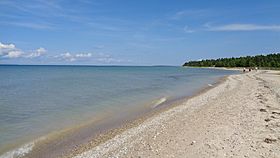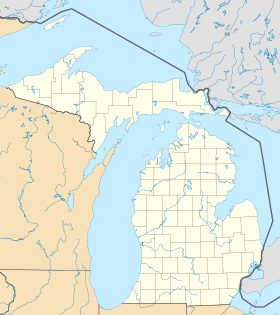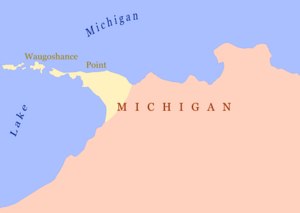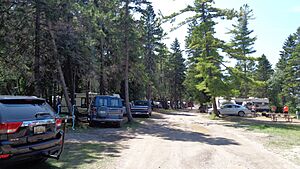Wilderness State Park facts for kids
Quick facts for kids Wilderness State Park |
|
|---|---|
|
IUCN Category V (Protected Landscape/Seascape)
|
|

Beachfront looking towards Straits of Mackinac
|
|
| Location | Bliss Township, Emmet County, Michigan, United States |
| Nearest town | Mackinaw City, Michigan |
| Area | 10,512 acres (4,254 ha) |
| Elevation | 607 feet (185 m) |
| Designation | Michigan state park |
| Established | 1922 (game reserve); 1927 (state park) |
| Administrator | Michigan Department of Natural Resources |
| Website | Wilderness State Park |
Wilderness State Park is a cool place to visit in Northern Michigan. It's a big park right next to Lake Michigan. You can find it about five miles southwest of Mackinaw City.
The park is huge, covering about 10,512 acres (4,254 ha). It has 26 miles (42 km) of beautiful shoreline along the lake. You'll also see lots of different forests, sandy dunes, wet areas, and places to camp. There are many miles of trails for hiking and exploring. The Michigan Department of Natural Resources takes care of the park. In 2012, Wilderness State Park was named a "dark sky preserve." This means it's a great spot to see stars because there's very little light pollution!
Exploring Wilderness State Park
One of the most interesting parts of the park is Waugoshance Point. This piece of land sticks out into northern Lake Michigan. Beyond the point, you can find two islands, Temperance Island and Waugoshance Island. These islands are also part of the state park.
Near the park's western edge, there are four lighthouses. These lighthouses help guide ships away from dangerous rocky areas. They are called Grays Reef, Skillagalee Island, Waugoshance, and White Shoal.
Park History
The state started buying land for the park way back in 1896. More land was added over time. In 1922, this area became the Emmet State Game Refuge. A "game refuge" is a special place set aside to protect and help animals, especially birds, breed safely.
In 1927, the game refuge became an official state park. It was then called Wilderness State Park.
During the 1930s, a group called the Civilian Conservation Corps (CCC) worked in the park. These workers built many things. They created eight miles of trails and a public campground. They also built a four-acre pond called Goose Pond.
Amazing Wildlife
Wilderness State Park is home to many animals that live in the northern Great Lakes area. You might see black bears, beavers, bobcats, mink, muskrats, and otters.
The park's rocky beaches are a perfect home for a special bird called the piping plover. This bird is endangered, which means it's very rare. In 2002, about one-third of all the piping plovers nesting in Michigan lived in Wilderness State Park!
Sometimes, people even see wolves near the park's shoreline. In 2015, officials confirmed that wolves were living in the Lower Peninsula.
Fun Things to Do
Wilderness State Park offers many fun activities for visitors. You can go swimming in Lake Michigan or have a picnic. There's a boat launch if you want to go out on the water. Fishing is also a popular activity here.
The park has a large campground with 250 sites. You can also rent cabins for your stay. There are 16 miles (26 km) of trails for you to explore. These trails are great for hiking, mountain biking, and even cross-country skiing or snowmobiling in winter. A 10-mile-long (16 km) part of the famous North Country Trail runs through the park.
 | Chris Smalls |
 | Fred Hampton |
 | Ralph Abernathy |




